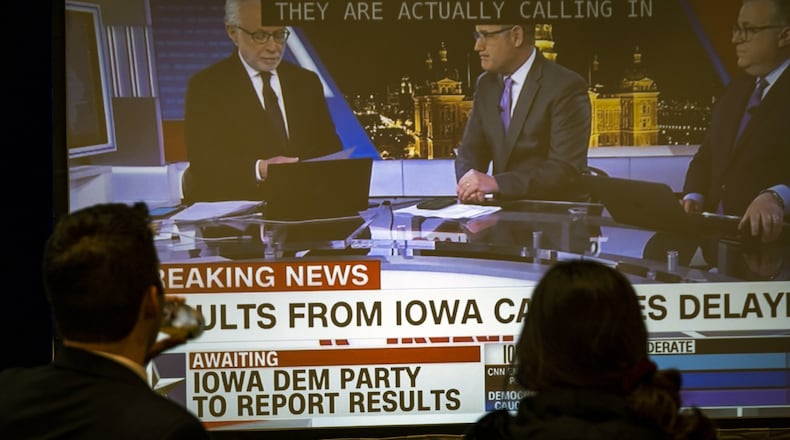The caucus confusion that upended Monday’s vote in Iowa triggered renewed calls for Georgia or other more diverse states to head to the front of the voting line in the next presidential election cycle.
The digital breakdown caused by technical flaws in a smartphone app and a phone backup system forced Iowa Democrats to delay the release of caucus results and fueled more calls from critics who say the Midwestern state should give up its prized status as the first state in the nation to vote.
Long before Monday’s disarray, a growing number of influential Democrats said Iowa, with a largely rural and overwhelmingly white population, was not reflective of the nation’s diversity. As Iowa officials struggled with the aftermath of Monday’s caucus, some forcefully floated Georgia as a stand-in.
“My vote is Georgia — it has one of the youngest, most diverse electorates that’s only getting younger and more diverse,” said Jon Favreau, a former speechwriter for President Barack Obama and a popular podcast host. “And it’s big, but not as expensive and television-focused as really big states.”
Georgia’s population is roughly triple the size of Iowa’s, and its population is younger and growing far faster than its smaller counterpart. Roughly one-third of Georgia’s residents are black, compared with 4% of Iowa residents. The two states have similar proportions of Hispanic residents.
While jumping the line is unlikely — neighboring South Carolina appears to have a better chance — it didn’t stop some Georgia leaders from raising the possibility. Gov. Brian Kemp told News 95.5 and AM 750 WSB on Tuesday that Georgia could “definitely handle it.”
“I always felt like Georgia ought to have more influence, just because we’re a big state, very diverse. It has something for everyone,” Kemp said, adding that Monday’s confusion raised new questions about the “age-old tradition” of caucuses.
“People are very passionate about it, but it’s also very flawed — as you can see right now,” he said. “Nobody has any idea of what happened last night. If they don’t clear it up in the next day or two, it won’t matter what happened in Iowa. It will all be focused on New Hampshire.”
The Republican added: “There’s definitely a play there, but you’ve got to get the political parties to play ball.”
Atlanta Mayor Keisha Lance Bottoms, one of the state’s most prominent Democratic elected officials, was asked a similar question at a voting site in Davenport shortly before the caucusing started. She put the idea on ice.
“Out of respect and regard for the order of things now, I just think we need to delay that discussion,” she said in an interview. “I mean, obviously there are a lot of thoughts on who should be first. Somebody has to be first. I look forward to having a conversation about it, but it needs to be had after we get out of the primaries.”
The other early-voting states, meanwhile, will enjoy a new surge of attention. White House hopefuls fast turned their focus to New Hampshire, which holds its primary in a week. Next up are contests in Nevada and South Carolina, the first state in the South to cast ballots this election season.
That race could be the best indicator of how Georgia Democrats will vote in their primary March 24, given the similarities between the neighboring states’ majority-black voting blocs. It will also provide a giant test for former Vice President Joe Biden, who sees the South as his firewall.
“It raises the stakes for Biden,” said Alan Abramowitz, an Emory University political scientist who was in Iowa for the caucus. “It means he really needs a strong showing in South Carolina. It’s looming very, very large. If he can’t do well there, he’s finished.”
Abramowitz and others sounded skeptical about a Georgia push to skip to the front of the voting line. So did some Democratic state legislators, who noted the state’s ongoing struggles to overhaul its electoral system and replace voting machines.
“I believe there have been discussions in the past about moving Georgia’s primary,” said state Rep. Dar’shun Kendrick, D-Lithonia. “But I believe the secretary of state’s office may have its hands full already.”
IOWA-GEORGIA
Population
Iowa: 3,155,070
Georgia: 10,617,423
Percent change since April 2010
Iowa: 3.6%
Georgia: 9.6%
U.S.: 6.3%
Residents 65 and older
Iowa: 17.1%
Georgia: 13.9%
U.S.: 16.0%
Race and Hispanic origin
Iowa
White, not Hispanic or Latino: 85.3%
Black or African American: 4.0%
Hispanic or Latino: 6.2%
Georgia
White, not Hispanic or Latino: 52.4%
Black or African American: 32.4%
Hispanic or Latino: 9.8%
U.S.
White, not Hispanic or Latino: 60.4%
Black or African American: 13.4%.
Hispanic or Latino: 18.3%
Persons without health insurance
Iowa: 5.6%
Georgia: 15.7%
U.S.: 10.0%
Median household income
Iowa: $58,580
Georgia: $55,679
U.S.: $60,293
Persons in poverty
Iowa: 11.2%
Georgia: 14.3%
U.S. 11.8%
About the Author
Keep Reading
The Latest
Featured


